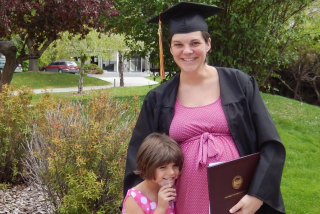Loss and forgiveness beautifully told
- Share via
“Love and Country,” Christina Adam’s debut novel, doesn’t offer writerly feats of postmodern prowess; it simply tells a good story, the old-fashioned way, with no fuss and with plain-spoken characters.
Those who enjoyed Adam’s 2001 collection of stories, “Any Small Thing Can Save You,” will also find much to savor in her first novel. Sadly, however, no more work will be forthcoming from Adam, who died of a heart attack on July 6. She was 55.
Set in 1984, “Love and Country” covers four seasons in the life of 14-year-old Kenny Swanson. He’s a sad child coming of age in an Idaho ranching town, living with his single mother, Lenna, who endured a nasty divorce from Kenny’s father. There is nothing easy about their lives, yet the bond she shares with her son allows them to get by, if not happily, then without too much harm most of the time.
At its heart, “Love and Country” is about the absence of fathers; Adam explores this theme beautifully and without sentimentality. Lenna is hardly a perfect maternal figure, and well aware that no matter how hard she tries, her love is insufficient. Kenny can’t stop wishing that his father would play a more prominent role in his life, but he tries to keep his yearning to himself. Rather than have heart-to-heart mother-son talks, silences maintain a certain kind of household peace.
His father, Ken Sr., is a typical deadbeat dad: He misses child support payments, stays in touch with his son only sporadically and makes promises he cannot keep. Ken shows up at Lenna’s house one day with the news that he is getting remarried, and he insists on taking his son on a hunting trip. This briefly raises Kenny’s hope that his father will become a more consistent presence -- but he knows better. “His father gave the ‘If you ever need anything’ speech every time he saw him,” Adam writes. “At first Kenny thought it meant he should call if he needed something, like new gym shoes. But when he got older he understood it meant goodbye.”
Kenny finds a father figure in the charismatic Roddy Moyers, a local rodeo star. He worships Roddy and desperately wants to learn to ride a bronco, just like his idol. But Kenny is a dutiful son who has promised his mother that he won’t practice for the rodeo until she can afford to buy health insurance. Considering that she works a dead-end job for the county courthouse, he knows this dream won’t come true any time soon.
Alongside the story of the lonely Kenny is that of an isolated high school senior, Cynthia Dustin, who yearns to escape the stultifying environment of the town, to study music and to get away from her brutal father. She finds occasional solace in the company of Dill Nethercott, a lifelong friend of her father who “was more a dad to her than her own was.”
Like Annie Proulx, another writer who favors toughness over tenderness, Adam doesn’t let moments of comfort last long. So when Cynthia turns to Dill for help in getting a college scholarship -- something she must hide from her father -- Dill’s empathy goes only so far before he reveals a nasty, impatient side. Things are smoothed over eventually, but there’s little sense of security for any of these characters.
Cynthia is Kenny’s first love; when he sees her at school, he feels “his heart knock in his chest like blocks of wood clapped together.”
Adam unfolds this relationship as she does everything else in the novel -- slowly. It is unclear for much of the novel how the connection between these two will manifest itself. Cynthia isn’t sure what to make of Kenny at first, but the two become friends, united by their sensitivity and despair.
Although the characters in “Love and Country” are driven by intense emotions, they don’t talk much. The dialogue is spare throughout, compensated for by rich descriptions of inner lives. It’s hard to know at times where a narrative thread is going, exactly, and Adam is in no rush to share, but in the end the wait proves worthwhile. She explores the nature of forgiveness: How even in the most dire circumstances, and in the most frayed relationships, forgiveness becomes somehow possible.
It’s a temporary respite, but one for which these characters are grateful. Reconciliation comes at a heavy price in “Love and Country,” and there is no promise of happiness at its conclusion. But the reticence and ambiguity seem refreshing rather than distancing. There is an undeniable clinging to authenticity and to truth on the author’s part, which is admirable and rare. Adam’s death is no doubt a terrible loss in many regards. It leaves a deficit in the literary community as well.
More to Read
Sign up for our Book Club newsletter
Get the latest news, events and more from the Los Angeles Times Book Club, and help us get L.A. reading and talking.
You may occasionally receive promotional content from the Los Angeles Times.










